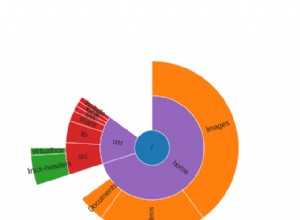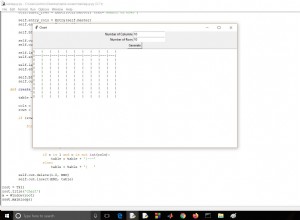OrderedDict est une sous-classe du dictionnaire, qui maintient l'ordre dans lequel les éléments/éléments y sont ajoutés.
OrderedDict préserve l'ordre d'insertion des éléments. Un dict par défaut n'enregistre pas la commande et aboutit à l'itération dans un ordre arbitraire.
Initialement, nous devons importer le module de collections pour utiliser le module de bibliothèque OrderedDict. Nous pouvons également importer uniquement la classe OrderedDict à partir du module de collections.
import collections from collections import OrderedDict
Fonctionnalités Python OrderedDict
- Création d'un objet OrderedDict
- Ajout d'éléments à OrderedDict
- Remplacement des éléments de OrderedDict
- Suppression d'éléments de OrderedDict
- Modification de la valeur-clé
- Fonction move_to_end()
- Élément pop OrderedDict
- Itération inverse
- Test d'égalité OrderedDict
1. Création de l'objet OrderedDict
Le OrderedDict() fonction est utilisée pour la création de l'objet.
from collections import OrderedDict
my_input = {'Pune': 'Maharashtra', 'Ahemadnagar': 'Gujarat', 'Orrisa': 'Bhubhaneshwar'}
# creating ordered dict from dict
ordered_input = OrderedDict(my_input)
print(ordered_input)
Sortie :
OrderedDict([('Pune', 'Maharashtra'), ('Ahemadnagar', 'Gujarat'), ('Orrisa', 'Bhubhaneshwar')])2. Ajout d'éléments à OrderedDict
from collections import OrderedDict
my_input = {'Pune': 'Maharashtra', 'Ahemadnagar': 'Gujarat', 'Orrisa': 'Bhubhaneshwar'}
# creating ordered dict from dict
ordered_input = OrderedDict(my_input)
#print(ordered_input)
print("Adding item to OrderedDict....")
ordered_input['Hyderabad'] = 'Karnataka'
print(ordered_input)
Sortie :
Adding item to OrderedDict....
OrderedDict([('Pune', 'Maharashtra'), ('Ahemadnagar', 'Gujarat'), ('Orrisa', 'Bhubhaneshwar'), ('Hyderabad', 'Karnataka')])3. Remplacement des éléments de OrderedDict
from collections import OrderedDict
my_input = {'Pune': 'Maharashtra', 'Ahemadnagar': 'Gujarat', 'Orrisa': 'Bhubhaneshwar'}
# creating ordered dict from dict
ordered_input = OrderedDict(my_input)
#print(ordered_input)
print("Replacing item from OrderedDict....")
ordered_input['Pune'] = 'Satara'
print(ordered_input)
Sortie :
Adding items to OrderedDict....
OrderedDict([('Pune', 'Satara'), ('Ahemadnagar', 'Gujarat'), ('Orrisa', 'Bhubhaneshwar')])
4. Suppression d'éléments de OrderedDict
from collections import OrderedDict
my_input = {'Pune': 'Maharashtra', 'Ahemadnagar': 'Gujarat', 'Orrisa': 'Bhubhaneshwar'}
# creating ordered dict from dict
ordered_input = OrderedDict(my_input)
#print(ordered_input)
print('Removal of item from OrderedDict....')
ordered_input.pop('Pune')
print(ordered_input)
Sortie :
Removal of item from OrderedDict....
OrderedDict([('Ahemadnagar', 'Gujarat'), ('Orrisa', 'Bhubhaneshwar')])5. Changement de clé-valeur dans un OrderedDict
Dans un OrderedDict, si la valeur correspondant à une clé particulière est modifiée, la position/l'index de cette clé reste inchangé.
from collections import OrderedDict
my_input = {'Pune': 'Maharashtra', 'Ahemadnagar': 'Gujarat', 'Orrisa': 'Bhubhaneshwar'}
# creating ordered dict from dict
print('Before the change.....')
ordered_input = OrderedDict(my_input)
print(ordered_input)
print('After the change.....')
ordered_input['Pune'] = 'Kiara'
print(ordered_input)
Sortie :
Before the change.....
OrderedDict([('Pune', 'Maharashtra'), ('Ahemadnagar', 'Gujarat'), ('Orrisa', 'Bhubhaneshwar')])
After the change.....
OrderedDict([('Pune', 'Kiara'), ('Ahemadnagar', 'Gujarat'), ('Orrisa', 'Bhubhaneshwar')])6. fonction move_to_end()
Le move_to_end() déplace une paire clé-valeur particulière à la fin du dict.
from collections import OrderedDict
my_input = {'Pune': 'Maharashtra', 'Ahemadnagar': 'Gujarat', 'Orrisa': 'Bhubhaneshwar'}
# creating ordered dict from dict
print('Before using the move_to_end().....')
ordered_input = OrderedDict(my_input)
print(ordered_input)
print('After using the move_to_end().....')
ordered_input.move_to_end('Pune')
print(ordered_input)
Sortie :
Before using the move_to_end().....
OrderedDict([('Pune', 'Maharashtra'), ('Ahemadnagar', 'Gujarat'), ('Orrisa', 'Bhubhaneshwar')])
After using the move_to_end().....
OrderedDict([('Ahemadnagar', 'Gujarat'), ('Orrisa', 'Bhubhaneshwar'), ('Pune', 'Maharashtra')])
7. Élément pop OrderedDict
Cette fonction apparaît et renvoie le dernier élément en sortie.
from collections import OrderedDict
my_input = {'Pune': 'Maharashtra', 'Ahemadnagar': 'Gujarat', 'Orrisa': 'Bhubhaneshwar'}
# creating ordered dict from dict
print('Original input dict.....')
ordered_input = OrderedDict(my_input)
print(ordered_input)
result = ordered_input.popitem(True)
print('The popped item is: ')
print(result)
print(ordered_input)
Sortie :
Original input dict.....
OrderedDict([('Pune', 'Maharashtra'), ('Ahemadnagar', 'Gujarat'), ('Orrisa', 'Bhubhaneshwar')])
The popped item is:
('Orrisa', 'Bhubhaneshwar')
OrderedDict([('Pune', 'Maharashtra'), ('Ahemadnagar', 'Gujarat')])8. Itération inverse
from collections import OrderedDict
my_input = {'Pune': 'Maharashtra', 'Ahemadnagar': 'Gujarat', 'Orrisa': 'Bhubhaneshwar'}
# creating ordered dict from dict
print('Original input dict.....')
ordered_input = OrderedDict(my_input)
print(ordered_input)
print('Reversed OrderedDict.....')
for elements in reversed(ordered_input):
print(elements)
Sortie :
Original input dict.....
OrderedDict([('Pune', 'Maharashtra'), ('Ahemadnagar', 'Gujarat'), ('Orrisa', 'Bhubhaneshwar')])
Reversed OrderedDict.....
Orrisa
Ahemadnagar
Pune
9. Test d'égalité OrderedDict
from collections import OrderedDict
# creating regular dict..
my_input1 = {1:'one' , 2:'two'}
my_input2 = {2:'two' , 1:'one'}
#creating ordereddict..
ordered_input1 = OrderedDict({1:'one' , 2:'two'})
ordered_input2 = OrderedDict({2:'two' , 1:'one'})
print(my_input1 == ordered_input1)
print(my_input1 == my_input2)
print(ordered_input1 == ordered_input2)
Sortie :
True
True
FalseConclusion
Ainsi, dans cet article, nous avons compris la différence entre Dictionary standard et OrderedDict et avons jeté un œil aux fonctionnalités offertes par OrderedDict.
Références
- Python OrderedDict
- Documentation OrderedDict


